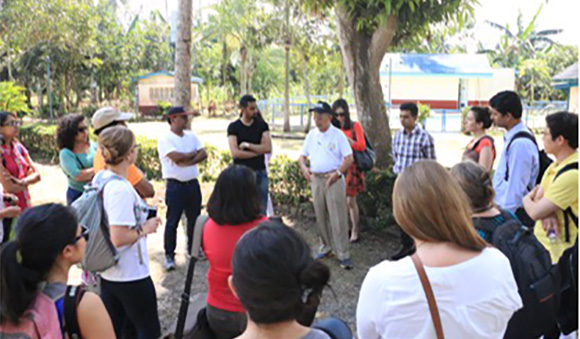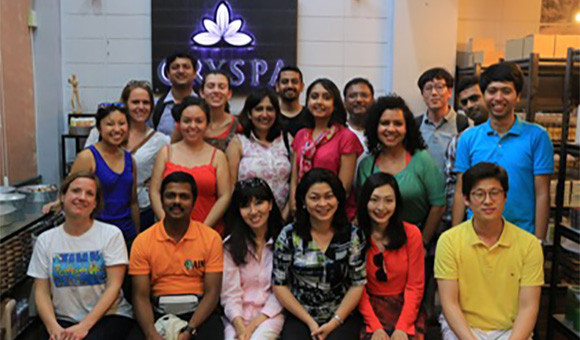Asian Institute of Management Philippines
The students of the Global Network for Advanced Management transited to Los Banos, Laguna, for a tour of the International Rice Research Institute (IRRI). With the aim to promote sustainability of rice planting and its production, soil scientist Dr. Cezar P. Mamaril mentioned that there is no such thing as organic rice, organic vegetable, and organic fruit if the soil was used as a medium of growth.

“It is not sustainable to grow organic rice because it is more expensive because of low yield. Without chemical fertilizers there is no greater yield. In the first place, the soil that we grow in are not organic, only a few percentage of its minerals. Even the rain and irrigation system coming from another field apply pesticides. We want to educate on minimizing use of pesticides but not fertilizers, which has less chemicals.”
Mamaril said that knowing the soil condition in is important if a farmer is to expect high yields and profits.

Meanwhile, Dr. Sarah E.J. Beebout discussed how to produce good rice yield. Having worked as a soil scientist for high zinc rice, she emphasized the following points: (1) Choose a variety of seed that grows well in local soil and that will cater to the local market. (2) Have an efficient water-management system. (3) Learn how to add the right amount of fertilizer. (4) Learn how to manage pests by knowing their cause and find a suitable solution for each. (5) In harvest, dry the rice before threshing so that it can be stored and milled into unpolished version before selling at some time.
”As labor for workers become scarce and expensive, providing community involvement is important. Youth engagement is needed to sustain the interest of farming in the new generation. We are careful not to get involved in child labor,” Beebout said.

In the afternoon, Oryspa’s owner and CEO, Sherill Quintana, told the students how she started her business, a franchise operating for more than five years now. Having started as a micro-entrepreneur who supplied aromatherapy and spa products to international clients, she faced a problem when the clients shifted their sourcing to other countries. After she realized that duplicating success is an entirely different business, she turned to the franchising system.
Having worked as a retail marketing professional, she observed that the franchise brands of choice in the country for natural spa products are from top global brands. She realized that brand building is more sustainable in terms of marketing awareness. “We should be able to bring our business overseas and capitalize on the foreign market.”

Her team focused on its strength, which is product development. With a background in forest product engineering and a husband who works for the IRRI, Quintana figured out that over 60 metric tons of rice brans are wasted. As an end product of the rice milling process, rice bran is rich in nutritional value and high in oleic acid, which helps it to be absorbed better by the skin, making it an ideal ingredient for massage oils and a sustainable alternative to synthetic oils.
It was then that Oryspa became the first maker of rice bran-based spa products in the Philippines, which has 65% bran formulation for all its products.
Quintana knew the company’s five-year plan needed to take the franchising route because it needed marketing and retail partners to build the brand. Starting with PHP 1 million in capital, Oryspa now has 20 franchise stores in the Philippines and two in Singapore. It offers a franchise fee of PHP 525,000, which includes the supply of the products excluding rental of the space. She mentioned that the key to business growth is team engagement through staff training, skills upgrading, and ensuring that franchisees meet the standards of their franchising system. After the lecture, students were given the time to try out and buy the products straight from the warehouse.
